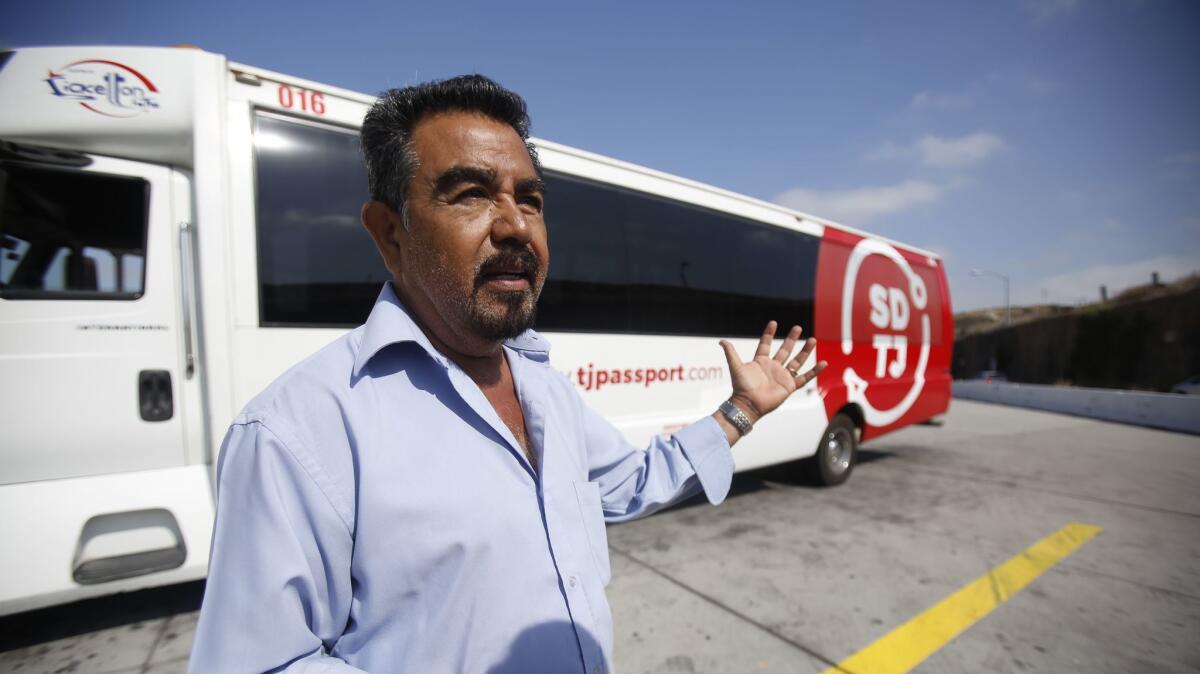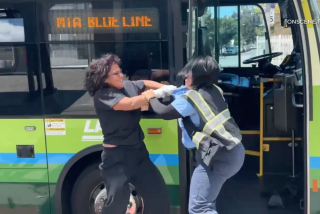Cross-border shuttle service is target of rock-throwing attacks

Reporting from Tijuana — Building a company that ferries passengers between Tijuana and San Ysidro is Carlos Díaz’s long-fought dream.
So when rock-throwers began targeting his Ticketon buses as the vehicles made their way from Tijuana’s airport to the U.S.-Mexico border, there was no question. He would keep going — even after 23 incidents in the past 16 months.
Just as it seemed things couldn’t get any worse, Díaz’s luck may have turned a corner. Business leaders and public officials in Tijuana are vowing that the rock-throwing attacks must stop; in recent days, they’ve made public statements and held news conferences to support Díaz, Ticketon’s founder and president. And on Monday, for the first time, police arrested three suspects.
“This is not just an act against Ticketon,” Baja California tourism secretary Oscar Escobedo said in a Tijuana news conference. “This affects all tourism operators in the state.”
In the complex world of cross-border commerce, Ticketon fills a niche: shuttling passengers between Tijuana and San Diego in a narrow strip that spans the international border.
With 25 buses, minibuses and vans of varying sizes, the company transports an average of 180 clients per day. Most of those customers are passengers in transit, making their way between Tijuana’s A.L. Rodríguez International Airport and San Ysidro, where they board buses for destinations such as Anaheim, Riverside, Ontario and Santa Ana.
Ticketon is not the first cross-border bus company targeted by rock-throwers. In 2002, a San Diego charter bus company suspended operations because of rock-throwing incidents after cab drivers complained buses were stealing their customers. In 2007, five companies reported a total of 30 such attacks in a two-week period.
Despite the rock-throwing incidents against his vehicles, Díaz vows to stay in business. “We’ve all got to do our bit to reactivate tourism,” he said.
The attacks against Ticketon began more than a year ago, after Díaz seized on a new opportunity: transporting tourists between San Ysidro and Tijuana’s tourist strip, Avenida Revolución. He harbors childhood memories of the street being filled with visitors, and he hopes to bring back crowds of visitors to the city.
That service, called TJ Passport, hasn’t sat well with a group of Tijuana yellow-taxi operators who have sought to control the business of driving pedestrians who walk into Tijuana from San Ysidro, Díaz said.
A news crew from the Spanish-language Telemundo television station in San Diego happened to be shooting a story about the rock-throwing incidents when a Ticketon bus was attacked on Monday.
Police arrested three suspects. Two of those individuals are linked to the yellow taxis, police said, and all three face charges of carrying out a dangerous attack as well as causing property damage connected to gang activity.
“This type of crime hurts tourism and damages the image” of Baja California, said Jorge Alvarez, head of the Baja California Attorney General’s Office in Tijuana. “This is not just a crime about a rock that shatters a window. It is far more complex.”
The leader of the yellow taxis, Oscar Morales, could not be reached for comment.
Since the attacks began in February 2016, Ticketon has suffered $20,000 in material damage and business has dropped off by 25%, Díaz said.
Though no passengers have been injured, one of his drivers was struck by a rock but was able to safely pull over to the side of the road. Tijuana police cars, with lights flashing, now escort Ticketon buses between the airport and the border.
Dibble writes for the San Diego Union-Tribune
More to Read
Sign up for Essential California
The most important California stories and recommendations in your inbox every morning.
You may occasionally receive promotional content from the Los Angeles Times.











